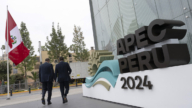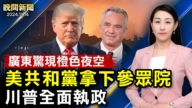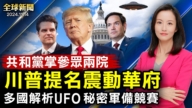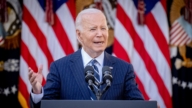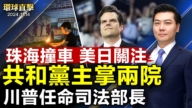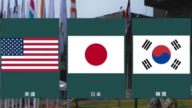【新唐人2013年10月09日訊】在印尼巴厘島舉行的「亞太經濟合作會議(APEC)」8號閉幕,各經濟體領袖發表領袖宣言,內容包括將支持持續推動多邊貿易。中共國家主席習近平首次出席APEC峰會,並且借道訪問印度尼西亞及馬來西亞,這也是習近平就職主席以來的首次東南亞之行。對於美國總統歐巴馬缺席這次「亞太經合組織峰會」,有媒體說,這可能會對美國的地位產生影響,中共因此獲得更大的國際舞臺空間。然而評論認為,東南亞這些國家與美國的關係,不會因為美國總統的一次缺席而改變局面,亞洲國家不會因此而重新站隊。
為期兩天的「亞太經合組織(APEC)」第二十一次領袖非正式會議,8號舉行閉幕儀式,各經濟體領袖也發表領袖宣言,表達將持續支持推動多邊貿易。
成立於1989年的「亞太經合組織」現有21個成員國家或地區。今年的主題是「活力亞太、全球引擎」,3大議題為「實現茂物目標」、「達成公平的永續成長」、「促進連結」,並著重於推動「經濟與技術合作」等能力建構的具體工作計劃。
美國歐巴馬總統因聯邦政府關門,而沒有參加這次峰會,有部分媒體描述﹕盟國對此大失所望。
美國政治學者冉伯恭博士認為,目前一些媒體過分渲染了美國沒有參加這次峰會的影響,他表示,「中國主導APEC會議討論,對中國、對習近平來說,是很好的機會。但是,這是暫時的現象,對美國的亞洲政策不會有長久影響。美國對亞洲的長期影響,不會因為歐巴馬這次缺席會議有重大的改變。」
時事評論員藍述:「我覺得這次歐巴馬沒有去參加亞太經濟會議,一方面是因為美國國內現在出現了美國聯邦政府出現關門的事情,另外他不去亞太高峰會議,主要是他對亞洲和太平洋地區國家跟美國的關係,他有充分的信心。」
美國國務卿克里(John Kerry)這次代表歐巴馬出席會議時也強調,美國對亞洲的海事安全和貿易談判的承諾不變。
事實上,美國總統因為聯邦政府停擺而取消APEC年會行程,歐巴馬並非第一人。1995年柯林頓也曾因為府會政爭,而在APEC大阪峰會舉行前夕,臨時取消出席計劃。
旅美中國問題專家陳破空:「我認為,歐巴馬此行沒有去,在國際形象上,雖然有一點影響,或者表面上解讀為:中國元首可以去東南亞,美國元首沒有去,中美較勁,好像是中國佔了上風。但事實上,東南亞這些國家與美國的關係不會因此受到任何影響。美國的重返亞洲戰略或在平衡戰略也不會受到影響。」
旅美時事評論員陳破空在接受《法國國際廣播電臺》採訪時表示,歐巴馬取消APEC峰會,有「一箭雙鵰」的作用。因為美國前幾年發起「泛太平洋戰略經濟夥伴關係協定(TPP)」,這個聯盟已經取代了APEC峰會,而他這次未能出席APEC,實在是因為共和黨未同意他提出的法案而走不開。陳破空認為,這是歐巴馬的哀兵之計。
陳破空:「主要是因為中國(中共)現在不僅在南海、而且在東海及釣魚島,都與周圍國家發生衝突。在這個時後,在亞洲國家形成了一個不信任的情緒。所以,亞洲國家基本上是遠交近攻,就是他結交美國這樣的大國,來保障亞洲的安全。所以,此次美國總統沒有去,中國(中共)國家主席去了,沒有改變一個根本的局面。就是說亞洲國家並不會因此而重新站隊。」
據了解,美國正試圖與11個亞太國家簽署「泛太平洋戰略經濟夥伴關係(簡稱TPP)協議」,以推動美國的出口,佔全球經濟總量的近40%。這11個國家並不包括中國。一旦「TPP」定案,將創下美國史上最大規模的自貿協議。
採訪/陳漢 編輯/黃億美 後製/郭敬
What is the Impact of Obama’s Absence at the APEC Summit?
The Asia-Pacific Economic Cooperation (APEC) summit
held in Bali, Indonesia, concluded on October 8.
Each economic systems’ leader gave their statements.
The contents included continued promotion of multilateral trade.
Chinese President Xi Jinping attended the APEC summit
for the first time, and visited Indonesia and Malaysia en route.
This is his first trip to Southeast Asia since he took the office.
Regarding U.S. President Barack Obama’s absence,
some media say it might impact the U.S.’s position, and the
Chinese Communists Party (CCP) would gain greater space.
However, commentators say that relations between
Southeast Asian countries and the United States
will not change because of one absence of the U.S. President,
neither will the Asian countries change their position.
The closing ceremony of the 21st APEC’s two-day
economic leaders’ informal meeting was held on October 8.
Different countries’ economic leaders said that
they will continue to support and promote multilateral trade.
The APEC was founded in 1989 and its members include
21 countries and regions. This year’s theme is
“Resilient Asia-Pacific, Engine of Global Growth."
The three key discussions were “Realizing trade goals,"
“Reaching fair and sustainable growth," and “Promoting unity."
It also focused on promoting “Economic and technical cooperation"
and other specific work plans on capacity development.
U.S. President Barack Obama didn’t attend this summit
due to the closure of the federal government.
Some media reported that allies were very disappointed at this.
U.S. political scientist Dr. Ran Bogong says that some reports
exaggerated the impact of the U.S.’s absence at the summit.
He says “China leading the APEC meetings was a very good
opportunity for Xi Jinping. This is temporary.
It won’t have long-term consequences to U.S. policy in Asia.
U.S. long-term impact in Asia will not see significant changes
because of Obama’s absence of the summit."
Commentator Lan Shu: “Obama’s missing the APEC was due
to the closure of the federal government;
the U.S. is confident in it’s relationship with the APEC region."
U.S. Secretary of State John Kerry attended the meeting
on behalf of Obama.
He also stressed that U.S. commitment to maritime security
and trade negotiations in Asia will not change.
In fact, Obama is not the first president who cancelled
a trip to APEC due to a federal government shut down.
In 1995, Clinton canceled his trip to the APEC summit
held in Osaka, Japan, due to political reasons.
U.S.-based China expert Chen Pokong: “Obama’s absence
has certain damage to the international image.
On the surface it may be interpreted as a China-US rivalry:
China’s leader went to Southeast Asia, yet the U.S.’s didn’t.
It may seem as if China prevailed.
But in fact, relations between Southeast Asian countries
and the U.S. will not be affected in any way.
U.S.’s strategic to return to Asia
or the strategic balance is not affected.
In his interview with Radio France Internationale (RFI)
Chen Pokong said Obama’s cancelation to the APEC summit
has double effects.
A few years ago the U.S. replaced the APEC summit with the
Trans-Pacific Strategic Economic Partnership Agreement (TPP).
Obama’s absence at the APEC was because the Republicans
did not agree with his proposed bill.
Chen Pokong believes that this is Obama’s plan.
Chen Pokong: “Now the CCP faces conflicts in the South
China Sea, as well as the Diaoyu Islands and the East China Sea.
Asian countries do not trust the CCP.
They form an alliance with big countries
such as the U.S. seeking security for Asia.
Therefore the absence of the U.S. president to the APEC
does not change the fundamental situation.
Asian countries will not change their stances due to this."
The U.S. is trying to sign the TPP Agreement with
11 Asia-Pacific countries to promote U.S. exports.
It accounts for nearly 40% of global economy.
The 11 countries do not include China.
Once TPP is finalized,
it will be the largest free trade agreement in U.S. history.
NTD Reporters Liu Yimei and Guo Jing



